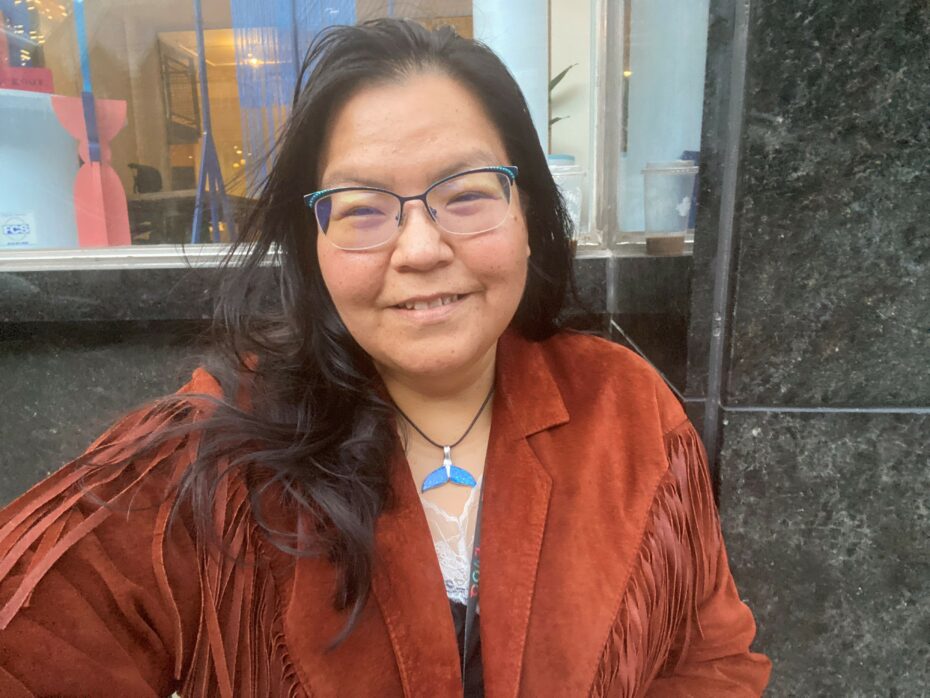
Maya Cousineau-Mollen, an Innu-Montagnaise writer, is McGill’s Mellon Indigenous Writer in Residence for 2022. Encouraged by her adopted parents, Cousineau-Mollen began writing poetry at a young age and has since incorporated writing throughout her life. Cousineau-Mollen is the cofounder of the First Nations Youth Council in Quebec and Labrador, in addition to founding the association étudiante autochtone à l’Université Laval. Published in anthologies and literary reviews, Cousineau Mollen published her first collection of poetry with la maison d’Éditions Hannenorak titled: Bréviaire du Matricule 082.
The Indigenous Writer in Residence program is one of the initiatives funded by the five-year US$1.25-million grant by the Andrew W. Mellon Foundation in June 2019 to support McGill’s Indigenous Studies and Community Engagement Initiative (ISCEI). The ISCEI promotes the growth of the Indigenous Studies Program in the Faculty of Arts, and aims to serve as a nexus for Indigenous scholarship and community-building and to facilitate communication and collaboration both across units at McGill, as well as in partnership with Indigenous communities.
“We are very excited to have Maya be the Indigenous Writer in Residence because she brings with her a passion and connection to her community that is very unique and specific to the Cote Nord Region of Mingan,” says Terry Young, Program Manager, ISCEI. “It is also very exciting to have a Francophone writer in residence because she is able to share her stories and experiences in French which is allowing for ISCEI to work closely with both the English and French Departments by giving class presentations and working with student groups on campus. In the coming weeks Maya will be providing a public talk on her experiences and her recent works.”
Maya Cousineau-Mollen will deliver her first lecture as Mellon Writer in Residence on February 23, at 2:30 p.m. The presentation will take place on Zoom in French. Registration is required.
Recently, she spoke with the Reporter.
You are the second ISCEI Writer in Residence. How important is it for McGill – and other institutions like McGill – to have initiatives like this?
First of all, you should know that I didn’t apply – I didn’t even know this program existed. But I was so honoured to be chosen – what a joy! It is a wonderful initiative.
Have you always been drawn toward poetry, even as a child?
No, when I was a kid, I was interested in reading – all kind of books. But in my period we didn’t have any role models as indigenous Writers.
Do you remember when you first started writing?
I was in 6th grade. I wrote a little tale of 6 or 7 pages. It was appreciated. After that I wrote a few science-fiction stories.
I started to write poetry when I was in Secondary 4. In high school I took a poetry class and since then, I’ve been hooked.
What is it about poetry that calls you or, conversely, what is it about you that is drawn to poetry?
Poetry is an outlet. Through it, I express what hurts me or makes me react strongly.
Are there recurring themes or overarching topics in your work?
- Identity as an adoptee and Innu women
- Elders
- Land
- My parents (Innu and Québécois)
- Sensuality as a First Nation woman
- Painful events like the Oka Crisis, the Wet’suwet’en [land dispute], and missing and murdered women
- Colonization and The Indian act
- Secret love
You are Innu by birth and were adopted by a “traditional” Quebecois family. How do these two realities inform your world view and your work?
It gives me a unique point of view. I see the different challenges … we face as a nation. I use my poetry as a medium to share the teachings of our Indigenous history.
Do you have any mentors or people who inspired you to follow this path? Any other writers in your family?
My adopted dad, Pierre Cousineau, who pushed me to write and also Claude Picard, Wendat, who is the mentor for my career and a wonderful guide.
Do you have a set schedule to write, with specific times of the day, or do you wait until you feel so inspired?
No schedule really. I wait for inspiration.
A writer of fiction sits down to write a specific story. How does it work when writing poetry?
It’s when I hear shocking news, or I see something that touches me. So, I write on my iPhone.. like Lee Maracle [Indigenous Canadian writer and academic of the Sto꞉lo nation] used to do. May she rest in peace.
Are you working on a new collection at present?
Yes, it will be published in April! The name of my second collection of poetry is : Enfants du Lichen.
Why is it important for people to read more Indigenous writers?
It helps to know us better. People are more are interested in us and in our stories. They want to know more and walk with us on this new path that we are beginning.
What do you hope to accomplish during your residency?
I’d like to start my third book of poetry.
Is there anything else you would like to add?
Just a big Thinashkumitin for this tremendous opportunity!
Maya Cousineau-Mollen will deliver her first lecture as Mellon Writer in Residence on February 23, at 2:30 p.m. The presentation will take place on Zoom in French. Registration is required.
